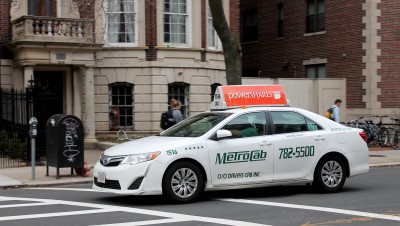
The Boston Police Department announced Monday an initiative to fingerprint all licensed taxicab drivers in Boston, according to a Monday press release.
The program, supervised by BPD’s Hackney Carriage Unit, is designed to improve safety and security for Boston’s citizens, the release stated.
“This program is intended to ensure the highest standards of safety for the traveling public,” the release stated. “The Boston Police Hackney Carriage Unit, which licenses all taxicabs in Boston, will now have another investigative resource at their disposal to allow them to conduct even more thorough background checks.”
Police Commissioner William Evans praised the initiative, saying in the release that it would ensure the continued safety of Boston’s travelers.
“The cab drivers in this city are hardworking men and women who welcomed this new safety requirement,” Evans said in the release. “When the citizens of Boston get into cab, they trust that operator to get them to their destination safely every single time. Fingerprinting is another step we can take as a police department to help make sure that happens.”
According to the release, more than 6,000 taxicab drivers are in the process of being fingerprinted, which acts as a part of their annual license renewal.
Officer Rachel McGuire, a spokesperson for BPD, described the fingerprinting process in an email.
“The actual fingerprinting process only takes a few minutes,” McGuire wrote in the email. “The department has ‘live’ fingerprint scanners. At the time of the driver’s hackney license renewal, the driver will be fingerprinted via computer scanner at Boston Police Headquarters.”
McGuire also described the cost of the fingerprinting, which will contribute to government revenue.
“Hackney licensed drivers are required to pay a one-time $50 fee, $30 of which will go to the state and $20 of which will go to a city fund,” McGuire wrote in the email.
Dave Sutton, spokesperson for the “Who’s Driving You?” public awareness campaign, discussed the importance of a fingerprint background check as opposed to a private background check.
“The very best way to protect the passenger public is to fingerprint drivers,” Sutton said. “A fingerprint background check is a government-conducted, fingerprint-based criminal background check, versus a background check which is not necessarily a criminal background check but one where you can sign up with a name and a social security number.”
Sutton explained that a non-fingerprint background check allows applicants to provide a fake name.
“The fact that you can sign up with a name means that people can sign up with fake names, and they have,” Sutton said. “That’s why it’s so important, because biometrics these days, they take a picture of your fingerprint and it is the only true way to identify that the individual applying is who he or she says she is.”
Sutton also asserted that transportation network companies, such as Uber and Lyft, should be required to undergo fingerprint-based background checks. Sutton said TNCs use private background checks that only go back seven years in time.
“Massachusetts is preparing to discuss and vote on legislation and the key question is whether or not Uber and Lyft drivers will be fingerprinted,” Sutton said. “Passengers are vulnerable. Often the passengers are alone or riding by themselves, I should say. They may be tired, they may be in a part of the town they don’t know and, more importantly, the driver has control of the vehicle. So people don’t always realize that passengers are a uniquely vulnerable population.”
Several residents said they were pleased to hear of additional measures to keep riders safe.
John Freeman, 52, of Dorchester, said he was surprised that taxicab drivers weren’t previously required to be fingerprinted.
“I knew Uber drivers weren’t checked very well, but you’d think that cab drivers would already have been fingerprinted,” he said. “I’m glad they will be now. That rule should have been in place a long time ago.”
Chris Grace, 52, of the North End, said he agreed taxi drivers should have thorough background checks.
“It’s just so important to feel safe because so many people take taxis,” he said. “There’s nothing you can really do to protect yourself if you’re in a car with someone and they turn out to be a bad apple.”
Barbara Davis, 69, of Dorchester, said she wouldn’t feel comfortable riding in a taxi if the drivers weren’t fingerprinted.
“I wouldn’t get into a taxicab unless I knew they did a whole background check,” she said. “There are too many scary people out there. I never took taxis for that reason. I didn’t know if they were checked or who they were. Anything can happen.”






















































































































